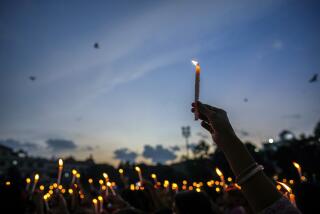Public Strike Follows Tragic India Stampede : Protest: Shops, offices and schools in Nagpur close in sympathy for 113 victims. Official resigns in disgrace.
- Share via
NEW DELHI — In a shiver of outrage and horror, residents closed shops, offices and schools Thursday in a central Indian city where 113 people perished after baton-swinging police charged a protest march, and a government minister resigned in disgrace.
Between 60% and 70% of the businesses in Nagpur, 375 miles south of New Delhi, were shut by the sympathy strike, said C.K. Gouri, an officer in the city’s police control room. Schools and colleges locked their doors for the day.
Even as criticism of their conduct mounted and a report circulated that the accidental discharge of an officer’s gun might have caused the mayhem at Wednesday’s march, police arrested 10 people, including the demonstration’s organizer, on charges of provoking rioting and accidental deaths.
Paramilitary units were positioned across Nagpur to prevent any more violence. “Police are on full alert,” spokesman S.K. Kammath said.
According to the latest information, officials said, 113 people died after being trampled in a panicky stampede, and 46 of the estimated 500 injured were still hospitalized.
The dead succumbed to shock, massive internal injuries and asphyxiation, hospital officials said.
Throughout India, the tragedy topped newspaper front pages. Due to its timing and the fact that very poor and low-status people were the victims, the event could prove to be political dynamite.
The state, where Nagpur is located, Maharashtra, is one of India’s richest and most populous and is supposed to hold local elections by next March. Its chief minister, Sharad Pawar of the ruling Congress (I) Party, is a former defense minister and aspires to become prime minister.
The victims of Wednesday’s stampede were from one of the lowest rungs of India’s caste-conscious, polarized society. Known as adivasis , a Hindi word meaning “original inhabitants,” they are poor members of tribes who generally dwell in the country’s central highlands and forests.
An estimated 50,000 of them gathered Wednesday on a square in Nagpur, where the Maharashtra state legislature was meeting in its winter session, to demand that their legal status be changed so they can benefit from the special quota of government jobs, legislative seats and school admissions reserved for so-called “scheduled tribes,” among the most destitute and uneducated strata in India’s diverse society.
One subgroup in the caste already has the beneficial status, adding to demonstrators’ sense of injustice.
Wednesday’s stampede began after marchers tried to break through police barricades and reach the state legislature. The police charged, their bamboo canes flailing in the air. Some of the frightened marchers tried to retreat, crushing others underfoot.
The Press Trust of India news agency said the dead included 24 children. Seventy-five others were women. In a statement, Pawar said the tragedy could have been averted if militant adivasi leaders had not placed women, children and old people in the vanguard.
Assuming “moral responsibility” for the deaths, the state’s minister for tribal development, Mudhukarrad Pichad, resigned. The demonstrators had demanded a meeting with either Pawar or Pichad, but that demand was not met.
The United News of India agency quoted an unidentified eyewitness as saying that marchers had collided with a policeman as officers began their baton charge, the policeman’s gun fell and went off accidentally. “The gunfire scared the people, and they began running into alleys,” UNI said.
Pawar announced a judicial probe of the tragedy and tried to calm tempers by promising $3,240 to the family of each victim and government-paid medical care for those who were injured.
But Pawar’s foes called for his resignation, and the Hindu nationalist Bharatiya Janata Party, or BJP, whose Parliament members donned black armbands, called Thursday’s strike.
On Thursday, weeping people in Nagpur searched for friends and relatives at the state-run hospital. At a stadium, leaders of the ill-fated protest read the names of the missing to an anxious crowd.
Ram Dhan, chairman of the National Commission for Scheduled Castes and Scheduled Tribes, was heading to Nagpur to investigate the protesters’ complaints.
More to Read
Sign up for Essential California
The most important California stories and recommendations in your inbox every morning.
You may occasionally receive promotional content from the Los Angeles Times.













